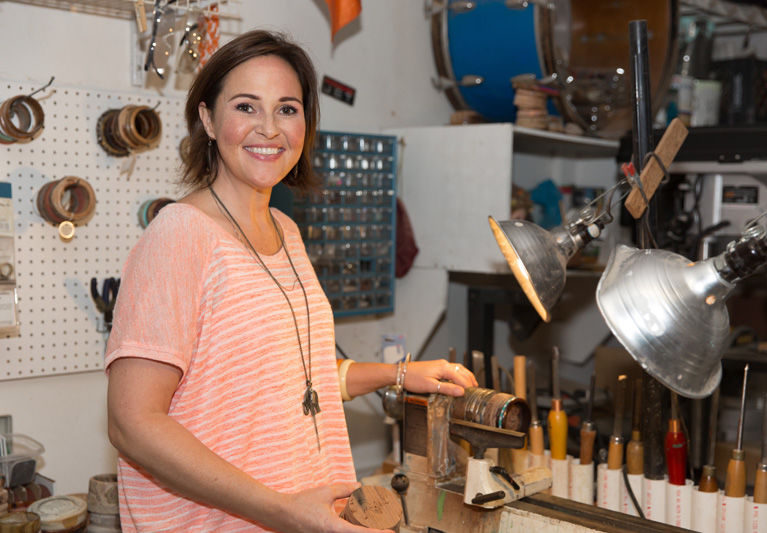
When Melanie Jones took her 70-year-old mother backpacking on the Appalachian Trail, they only expected to go three miles. Two days and 16 miles later – including an overnight at a shelter – the only part her mother regretted was not packing marshmallows.
“I just love adventure!” she told her guilt-ridden daughter.
“It was my fault,” says Jones, pulling out the crumpled map she’d used, the width and length of her forearm. “I thought you could GPS it, but there was no service.”
With that kind of spirit in her DNA, it’s no surprise Jones, who grew up catching crawdads in the woods of Tennessee, has found her calling in a pile of gnarled wood and some power tools.
From the garage of her south Vero home, her two tiny dogs zooming around her, Jones has set herself up in business making handsome bangle bracelets on a lathe.
Many are made of wood she found on her trips home to Tennessee. Others are carved from citrus wood picked up in Vero’s abandoned groves. Still others are from rare wood she buys from collectors.
Some remain in their natural form, the grain or burl exposed. Others have been shot through with an electric impulse, blackened in craggy lines “like they’ve been hit by lightning,” as Jones puts it.
Jones, an avid recycler and environmentalist, occasionally inserts found objects in a groove within the bracelets. Sharks’ teeth are a hot seller – they go for $200 and up. Others have tiny sea shells, some tinted or embedded in colored gels.
Perhaps the most unusual bracelets she’s working on are made with repurposed books. Chopping out a block of pages or illustrations, Jones cements them together with a glue-like mixture that she says has taken her months to concoct. She then cures the block of pages for six months before turning them on the lathe just as she would with a block of wood.
The resulting bangles, hard as wood and similarly sanded and varnished, have varying degrees of legible words or discernible images – enough to hint at the content of the book. Her dream is to do commissions for people, either of beloved books or personal journals.
Some are from pieces of wood obtained through her mentor, Jack Shelton, a Fort Pierce-based woodturner who is part of a guild, Treasure Coast Woodturners. Many of those crafters have works for sale in galleries in the Fort Pierce art district, including in Art Mundo.
It was there that she first met Shelton and began attending his Wednesday morning class in woodworking, where students gather to work on up to six lathes in his workshop.
Before that, though, Jones learned the basics from her step-father, who used to do his wood-working in a windowless room in the rear of the house in Johnson City, Tennessee.
On visits to Tennessee, she noticed he would disappear into his shop.
“I felt sorry for him because there were nothing but girls in the family, and he’d spend hours by himself in the workshop. So I’d go down there and ooh and ahh and go back to putting on makeup and trying on clothes.”
Then one day, just to please him, Jones announced, “I want to try that.”
Her step-dad looked at her with surprise, but then showed her how the lathe worked.
“He’d get me started and then leave me be after he felt I was going to be OK,” she recalls. “I’d be up until 2 in the morning experimenting with things.”
Back home in Florida, her enthusiasm had to be put on hold – she had no power tools. But on her next trip to Johnson City, her step-dad asked if she’d like to take a class in woodworking; specifically, bracelet making.
“I said absolutely,” Jones recalls. “It’s a feminine thing. Let the men make pens and bowls. I like the feminine aspect of bracelets.”
She also likes that as wearable art, they’re easy to sell. From her Facebook page alone, she has managed to sell enough to make a living, asking between $30 to $200 for each, depending on the rarity of the wood or the technique involved. As her confidence increased, she developed a logo and began signing her works.
Support comes readily from within the arts district in Fort Pierce, she says.
“They’re really developing an art district that’s approachable and affordable, both in the rent and the art itself. It’s a community of artists that really help each other. If I come across something that’s steam-punk, I’ll share it with the artist who works in that. Or give fabric to a quilter, or stationery to a multi-media artist. We all look out for each other.”
Woodturners in particular are known to keep their egos in check, she says. “There is no competition among woodturners,” she says. “We all know ego will kill your talent.”
While woodturning in general is a male-dominated craft, in her Fort Pierce sessions with Shelton, there are two other women perfecting their craft with him.
“I take him all my problems,” says Jones. “I show him my mess-ups, and he teaches me how to fix them. That’s how I know I’m progressing as an artist.”
“Melanie has the ability to produce technically excellent work,” says Shelton, whom Jones calls her “woodfather.” “That, coupled with her creative drive, will elevate her work to an art form that produces a beautiful result.”



